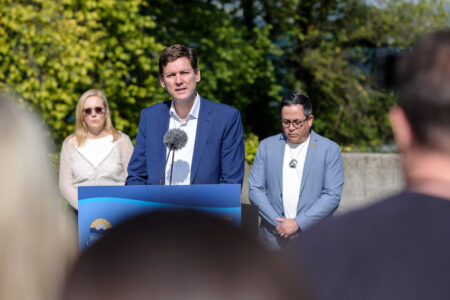Not everyone jumping on the BC balanced budget bandwagon
BC Finance Minister Michael de Jong delivered the government’s third consecutive balanced budget saying the document builds toward a stronger and more diversified economy and delivers additional support to British Columbians who are most in need.
However, not everyone is lining up to jump on the bandwagon of the Liberal Finance Minister.
Here are some of the reactions to the 2015 BC Budget:
The BC School Trustees Association
“It is unacceptable that the dollars saved by school districts will not be retained to address needs in our schools,” said BCSTA president Teresa Rezansoff.
“We understand the importance of cost saving measures such as shared services, but they must not be used to take money away from Boards of Education.”
Boards of Education across B.C. will once again be facing significant financial shortfalls this Spring as the result of the new provincial budget for K-12 education.
Although the education budget will be increased over the next three years, the majority of these additional funds have been allocated toward the cost of new teacher and support staff collective agreements signed late in 2014.
BCSTA will be seeking further clarity as to how these funds will be dispersed to meet the obligations of individual Boards of Education.
This leaves very little, if anything, for Boards to use toward meeting continuing, unfunded cost pressures.
BC Greens
“A 21st century economy requires us to live within our means” says Adam Olsen, Interim-Leader of the B.C. Green Party.
“But it also means that the costs are shared according to our means. In this budget the Government continues to leave too many British Columbians behind.”
The budget continues to be balanced on the backs of those who can least afford it. For instance, despite calls to shift MSP premiums into the progressive tax system, the B.C. government has instead raised premium rates by another 4%. The rise of user fee rates that disproportionately target low- and fixed-income earners was accompanied by a tax cut for the top 2% of earners as the 16.8% personal income tax rate that was introduced in 2013 expired.
BC Nurses Union
The BC Nurses’ Union congratulates the minister of finance for balancing the 2015 budget. However, President Gayle Duteil is concerned about the future for seniors and others, if the government ignores growing health care challenges.
“As hospitals fill up to overcapacity, more elderly patients will be moved into long-term care. If residential care facilities aren’t properly resourced, many of those patients will return to the hospital, with increasingly complex needs and health care problems.”
This year’s health care budget has been increased by only 2.9 percent. The Conference Board of Canada reports that BC needs to increase the budget by 4.8 percent, or $2.3 billion, to maintain current service levels.
BC Federation of Labour
“It is extremely disappointing that the government is giving a tax break to the highest earners in our province, but are willing to leave our lowest paid workers living in poverty,” said Irene Lanzinger, President of the BC Federation of Labour.
Budget 2015 confirms that the personal tax rate for incomes above $150,000 will be eliminated. The loss of revenue to the province from this move is estimated to be more than 200 million dollars a year. The government has also confirmed that it will not increase the minimum wage, which has been stagnant for three years.
Currently there are more than 120,000 people in BC earning minimum wage. 47 per cent of those are over 25, and 63 per cent are women. At the current wage of $10.25 per hour, a person working a full-time job at minimum wage is living thousands of dollars below the poverty line.
“The government is essentially giving a raise to the highest earners. And the rest of us are being left behind with stagnant wages and paying more in fees and premiums, like MSP, ferry fares, tuition fees and hydro rates,” said Lanzinger.
“Further, this budget makes no substantial improvements to the public services people rely on every day, including health care and education.”

























